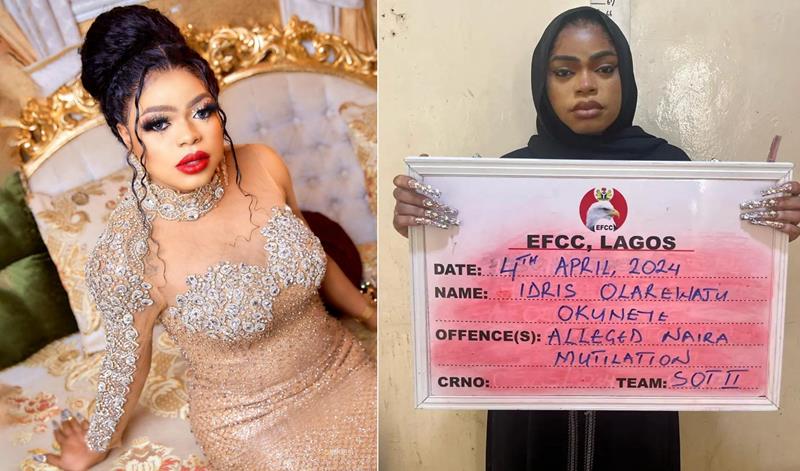Idris Okuneye, popularly known as Bobrisky, has filed an appeal against the six-month prison sentence imposed by the Federal High Court in Lagos, challenging the decision as excessively punitive. The sentence, handed down on April 12 by Justice A.O. Awogboro, was in response to charges filed by the Economic and Financial Crimes Commission (EFCC) for naira abuse, marking a significant development in the legal proceedings against public figures in Nigeria.
Background of the Case
Bobrisky, a well-known Nigerian cross-dresser and social media personality, was arrested and charged by the EFCC with four counts of naira abuse. This charge stemmed from actions deemed disrespectful and damaging to the national currency, which is a prosecutable offense under Nigerian law. In court, Bobrisky pleaded guilty to the charges, presumably hoping for leniency given his cooperation.
However, Justice Awogboro, in delivering the sentence, emphasized the need for it to serve as a deterrent to others who might consider similar offenses. The court decided on the maximum sentence allowable under the law for each count, cumulating in a total of six months imprisonment without the option of a fine.
The Appeal Against the Sentence
Following the judgment, Bobrisky’s legal counsel, Mr. Bimbo Kusanu, filed a notice of appeal with the Court of Appeal, seeking to overturn or reduce the sentence. The grounds of the appeal challenge the nature of the sentence and argue for a reassessment based on several legal and personal considerations that were purportedly overlooked during the initial trial.
Legal Arguments Presented in the Appeal
- Excessive Punishment: The appeal argues that the maximum sentence imposed is disproportionate to the nature of the offense, especially given that Bobrisky had no prior criminal record.
- Consideration of a Lesser Sentence: It points out that the Administration of Criminal Justice Act (ACJA) provides for lesser sentences or alternative punishments such as fines, which could have been considered.
- Acknowledgement of Guilty Plea: Bobrisky’s immediate guilty plea was highlighted as a factor that should typically mitigate the sentence, as it saved the court time and resources.
- Prompt Cooperation: The appeal also emphasizes Bobrisky’s cooperation with law enforcement from the onset, responding promptly to the EFCC’s summons, which is generally viewed favorably in judicial proceedings.
Request to the Court of Appeal
The appeal specifically requests that the Court of Appeal set aside the original sentence and instead impose a fine of N50,000 for each count of naira abuse. This suggested penalty reflects the defense’s view that a non-custodial sentence would be more appropriate and just under the circumstances.
The Role of Public Figure Status in Legal Proceedings

One of the nuanced aspects of this case is the impact of Bobrisky’s status as a public figure. High-profile individuals often face the dual challenge of navigating both legal and public opinion, which can sometimes influence the severity of legal actions taken against them. The defense argues that while Bobrisky’s public persona may have heightened the visibility of his actions, it should not disproportionately influence the legal consequences he faces.
Analysis of Judicial Discretion and Sentencing Norms
The appeal brings into focus the exercise of judicial discretion in sentencing, particularly how it interacts with statutory guidelines and the principles of proportionality and fairness. Legal analysts suggest that the outcome of this appeal could have broader implications for how courts balance the objectives of deterrence, punishment, and rehabilitation, especially in cases involving lesser offenses such as naira abuse.



